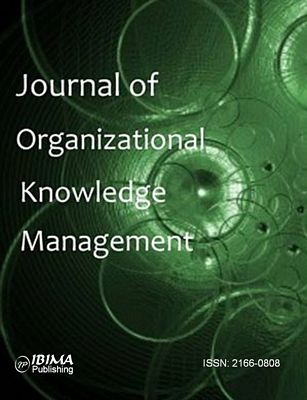Introduction
The national economy is closely linked to international trends and developments. These connections and dependencies are particularly evident in the export industry. On the one hand, opportunities and consumer demand influence economic relations; on the other hand, infrastructure, trade agreements and trade barriers also play an important role. Where are my products required? In which country can I place my product profitably? Entrepreneurs have to deal with many such questions. Exporting requires a lot of knowledge about the markets and framework conditions in the target country.
This study addresses the question of how knowledge can be used by exporting companies and how new exporters can be gained through knowledge transfer. The focus of the study is on exporters who already have some success in foreign trade, as well as potential exporters and professionals active in the export sector. The results of this study present measures and processes which can provide impulses for the export industry through targeted and standardized knowledge management.
The objectives of this research are to evaluate: business processes, the availability of existing knowledge, processes for the further development of export-relevant knowledge and knowledge transfer to people in the export economy. The focus is on the further development of the national export economy.
The research questions are:
RQ1: What is the role of information, collaboration and knowledge in the effectiveness of new or established exporters?
RQ2: What topics and information-related issues, collaborations and knowledge are most important when entrepreneurs start to sell their products abroad or want to expand their exports?
RQ 3: What measures are recommended as a stimulus for entrepreneurs who wish to become active in the export industry or want to become more involved?
The structure of the paper is as follows. Section 2 describes the theoretical framework and the relevant literature, Section 3 presents the findings and analyses the study results as an overview of process and flow management. In Section 4, application scenarios are developed. Section 5 and Section 6 provide the conclusions of the paper, and discuss the study’s limitations and give recommendations for the export industry and related institutes that support the export business.
Theoretical framework and related literature
There are many studies that deal with the ideal conditions for foreign trade. According to Costa, Soares and de Sousa (2016), information and knowledge can be seen as key resources for improving the internationalisation processes of small and medium-sized enterprises (SMEs). Collaboration has also been considered as an important facilitator of these processes, particularly by nurturing information and knowledge sharing.
For example, Ilmakunnas and Nurmi (2007) show that the larger, younger, more productive and capital-intensive plants are, the more likely they are to enter and less likely they are to exit the export market. Ilmakunnas and Nurmi also demonstrate that human capital in particular has diverse effects on export market entry, and that businesses becoming exporters have more educated but less experienced staff. “There is evidence that good plants have a higher probability of becoming exporters. Most of the evidence supports the selectivity view of exports rather than learning-by-exporting, as exporting shows little evidence of boosting firm productivity” (Ilmakunnas and Nurmi, 2007, 3).
Stucki (2016) analysed the export activities of Swiss start-ups. He believes that “at first glance, a typical start-up does not seem to have the required capabilities to enter foreign markets. “While the founders’ general human capital affects both, export propensity and intensity, their export-specific experience only affects export propensity but not intensity. Furthermore, we find evidence that the effect of general human capital is more persistent than the effect of specific human capital” (Stucki, 2016).
Scientists have presented evidence from more than 1500 sub-national regions of the world on the determinants of regional income and labour productivity.
The evidence suggests that regional education is the critical determinant of regional development, and the only such determinant that explains a substantial share of regional variation. The regional education influences regional development through education of workers, education of entrepreneurs, and regional externalities. The latter come primarily from the level of education (the quality of human capital) in a region, and not from its total quantity (the number of people with some education) (Gennaioli et al., 2013).
What knowledge is necessary in order to increase the export share of companies? What measures can be taken in the field of knowledge management to further develop human capital? Particularly in the international economy, many different factors play an important role, such as intercultural skills or market differences. The corporate design, which produces different effects on different markets, is mentioned as an example. “Therefore, managers should focus on design and managing proper [sic] their corporate image, also in order to compete and grow in the international area” (Villena Manzanares, 2017).
Costa et al. (2016) analysed the process of internationalization in terms of knowledge, information and collaboration, which can also be adapted to exports in a modified form. The processes apply to internationalization in general as well as to exports in particular.
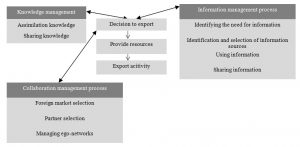
Fig. 1: Main information, collaboration and knowledge tasks related to export processes
Source: Own exposition based on Costa et al. (2016, 2)
Study Results as an Overview of Process and Flow Management
In 2015, in order to analyse the requirements for knowledge management with regard to foreign trade, an online survey was sent to entrepreneurs in the Austrian region of Burgenland. The survey invitation was sent to 16,000 registered email addresses, of which about 800 were classed as potential exporters by the Burgenland Chamber of Commerce. Forty-two participants responded.
In order to strengthen the results, 10 expert interviews were conducted with entrepreneurs who have already had some success exporting or who are intending to begin exporting. As a supplement, trade delegates representing the Austrian economy all over the world were asked online about the requirements and obstacles for exporting companies. Eighty-four Trade Commissioners participated in the survey. The Austrian Federal Economic Chamber has 110 offices in 77 countries. Analyses show that support for finding business partners, support in legal matters and a network of affiliates in the target market are ranked as the three most important services for exporters or potential exporters. Apart from the quality of the products, all the factors considered as important can be influenced by knowledge management, the collection and the provision of knowledge as well as the implementation of corresponding offers and processes in the sense of promoting the export economy. Increasing or measuring product quality is not a directly relevant matter for the export industry. Product quality affects companies on the internal market to the same extent as internationally and is therefore not dealt with further in this study.
Table 1: Important services for entrepreneurs who are already exporting or who
want to do so in the future
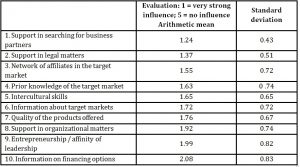
Source: Own Online Survey of Austrian Trade Commissioners in international offices 2017, 84 participants
Participants were also asked about the biggest obstacles to SMEs beginning or growing exports. Competition in the target market is considered to be the biggest obstacle in the way of exporting, followed by information deficit and a lack of entrepreneurial risk-taking. Target-oriented knowledge management could be used especially in the areas of information deficit, information about financing, intercultural and language skills.
Table 2: Biggest obstacles to entrepreneurs to begin or expand exports
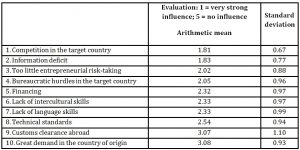
Source: Own Online Survey of Austrian Trade Commissioners in international offices 2017, 84 participants
The problem areas identified in the survey of entrepreneurs and the expert interviews are consistent with the survey of trade delegates. Important topics identified in all three sets of results include information deficits and the search for new business connections. The entrepreneurs consider it very important that information is made available to them and appreciate the offer, which is largely known to them.
The most popular service among entrepreneurs is the foreign trade organization of the Austrian Federal Economic Chamber (59.5%). Service offers are also well known: Export consultations (50.0%), market exploratory trips (40.5%), market analyses, events abroad and trade fair consulting (35.7%). Less well known are import consulting (4.8%), investment advice (7.1%) and technology consulting (7.1%).
Of the communication channels, the newsletter of the foreign trade organization (52.4%) is the most widely known among the exporters, circular letters are less important.
Concerning RQ1 – the role of information, collaboration and knowledge in the effectiveness of new exporters or established exporters and RQ2 – topics and information-related issues, collaborations and knowledge are most important when entrepreneurs start to sell their products abroad or want to expand export, it can be seen that:
- Information plays a very important role, whether it is referred to by institutions or other participants in business life. This was shown particularly in the expert interviews.
- In addition to providing information, entrepreneurs also want to share in and benefit from the experience of other exporters. They rate highly the opportunity to participate in the successful business relationships of their business partners. Respondents benefit from the export relationships of their business partners, as opportunities also arise for the export of their own products. Collaboration is a good method to enter a new market, the export of water and wine being a good example.
- Knowledge opens up new market opportunities.
- According to indications in the online surveys and in the expert interviews, information on the policies and framework conditions in the export destination (consumption patterns, competitors, regulations, trade structures, importers) is particularly important.
- Lack of information jeopardizes the success of exports. The company of one respondent slipped into insolvency due to a lack of information and support after deliveries to Japan.
- A lack of cultural and language competences is an obstacle to the export economy. The experts of the foreign economic centres advise studying the market personally and for entrepreneurs to visit the possible export country.
- Entrepreneurs are optimistic about the domestic export economy, but they often do not want to exploit their own The surveyed entrepreneurs estimate their export opportunities on a scale from 0 (more risk) to 100 (more opportunity) with a value of 63.14, i.e. more opportunity than risk.
Application scenarios
The results of the investigations – online surveys and expert interviews – can be summarized with regard to the need for knowledge management as follows:
- Information deficit, concerning:
- conditions in the target markets,
- matters of the company (finance, opportunities) and
- personality of the entrepreneur (intercultural and language skills)
- Potential business partners
The analysis of the above mentioned surveys has also shown that mainly online communication channels are used in relation to the external economy, e.g. the Internet presence of the Austrian Federal Chamber of Commerce and the Advantage Austria department. Circular letters are little used.
RQ 3: What measures are recommended as a stimulus for entrepreneurs who wish to become active in the export industry or want to become more involved?
The survey has shown that many exporters access information from the Internet and newsletters. The Internet plays an important role. It is also necessary to distinguish between the content and the objective to be pursued. For the most part, the exporters’ data are stored as part of the sending of newsletters. The information can be sent to them in such a targeted way. The situation is much more difficult for companies that have the potential to export but are still cautious.
Table 3: Analysis of export potential in the commercial economy
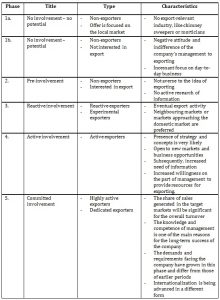
Source: based on Loisch, 2007, p28, and Bamberger and Evers 1994, p258ff
How can the potential of non-exporting companies be activated?
With regard to the definition of the target group, the following objectives can be formulated:
Motivation to enter the export business:
- Attracting new exporters by informing them of the opportunities of entering new markets
- Offer of manuals and contacts for further information
- Providing information events and meetings in the home country and foreign destinations
- Networking with business partners for information exchange
- Information on funding and financing offers
- Offers of cultural skills and language development for entrepreneurs and their employees
- Creating transparency through contacts
Process support for first exporters and established exporters:
- Use of undeveloped knowledge resources of the organization
- Networking of expert knowledge
- Increase the motivation of the business partners as “motivators”
- Increase the learning capacity of the organization
- Improve communication flow between employees
- Protect against loss of knowledge after the departure of employees
National targets:
- Increase the national export rate
- Increase of the export value
- Expansion of the exported product portfolio
- Expansion of the number of exporting countries
- Increase in value added
In terms of knowledge management, the Austrian foreign trade industry already uses various tools and information channels to motivate and inform entrepreneurs. According to the recommendation of the experts in the offices abroad, however, a visit to the target country is indispensable in order to get a personal impression of the situation and to make personal contacts.
As an example, the Austrian Federal Economic Chamber and the organisation Austrian Wine have drawn up a guide for exporters. They suggest that the starting point of the planning should be situation analysis. Step 2 is to find the right, economically profitable, target market. The logical consequence is the definition of goals, strategies (step 3) and measures (step 4). Only when capacity is understood will the right decisions and strategies be possible.

Fig. 2: Flow chart of export strategy, based on the suggestions of the Austrian Federal Economic Chamber and
Austrian Wine (2014)
The starting point of the planning stage is the situation analysis of the present internal and external state. As stated, only when capacity is understood will the right decisions and strategies be possible. So before a company goes to a business partner, it should be aware of whether it is ready for (sustainable) export. As an exporter, one must also consider that there are a lot of circumstances that will influence your business and your enterprise. The following are cited –
Situation analysis:
- Inside circumstances, such as product quality, financial resources, personnel
- External circumstances, e.g. potential buyers, risks on the foreign market, reasonable prices
Market selection:
- Political framework
- Economic conditions
- Geographical conditions
- Sales-related conditions
- Characteristics of the foreign market
- Need for the export of the product
- Sales opportunities
- Requirements for the export product
The Federal Austrian Economic Chamber and the organisation Austrian Wine suggest that before beginning to export, entrepreneurs should set themselves precise goals to try to achieve. These objectives could be defined as follows:
Objectives:
- Target market and target groups
- Partners (end consumer, retail)
- Amount
- Price
In order to achieve the objectives defined above, it is essential to define the appropriate strategy.
Strategy:
- Concentration versus diversification
- Market entry barriers, opportunities for market entry
If the strategy for an eventual entry into the market has been defined, it is important to put in place concrete measures so that the strategy can also be implemented. Some points which should be thought of:
Activities:
- Information (monitoring target groups, price structure, public relations)
- The offer (labels, assortment)
- Transport, processing
- Sales, distribution
- Communication, advertising
This list can also be applied to other product groups and branches. The processes and factors apply to all markets. However, depending on the market conditions (monopoly, high-price strategy and saturated market), the results differ.
There is a wide range of knowledge about the export industry. This study has shown that experts in the foreign trade organization also see this as a reason to establish a one-stop shop for the export industry, in order to centralize the available knowledge and to make it easily and quickly available.
As a result of the study, the following is recommended:
- Collection and development of diverse and individualized online information and service offers
- Promotion of personal contact exchanges
- Networking with possible business partners
- A central contact point for all questions of export
- Offers of knowledge and experience at home and abroad (meetings, consultations)
- Image campaign for exporters, highlighting opportunities and offering manuals
- Active target group approach, acquisition of new exporters
- Support in the process of strategic consolidation and formulation
- Support in planning the export process
- Support for resource building
Discussion
However diverse the export product is, the process always follows a similar pattern, and the requirements for the information, knowledge and networks in order to ensure the economic success of the enterprise are almost identical. Differences can occur after the start of the process depending on the stage at which the company is located, i.e. whether it is one of the pioneers or follows other companies.
Cerchione and Esposito (2017) differentiate SMEs into exploiters, explorers and latecomers. In their definition, the exploiter is an SME that intensively exploits the few knowledge management (KM)-Practices and KM-Tools at its disposal. This group has yet to become aware of the importance of investing resources in the field of KM and mainly uses traditional KM-Tools and KM-Practices not specifically dedicated to KM. The explorer uses innovative KM-Tools and KM-Practices specifically dedicated to KM. They invest in the field of KM and could become guidepost SMEs. Their role as multipliers would still have to be investigated. The latecomer is an SME that is still unaware of the strategic value of knowledge management and does not have the resources necessary to be competitive in the field of knowledge management. For successful knowledge management, the processes and measures have to be designed in such a way that all groups are captured in different time phases and with different intensities. It will be a great challenge to arouse interest in the available knowledge for such companies.
Companies are active in different markets and have different products at different stages of market entry. They also differ greatly in their integration into regional and international networks. For a successful knowledge management and sustainable success in the export industry, it will be necessary to make a basic offer, which gives the opportunity for individualization and expedites processes that companies can pick up from their present situation.
Summary and Recommendations
There is already a wide range of information available on exporting and export-destinations, which is particularly important, but the present study shows the need to make this knowledge available at a single location and to be individually applicable. Particular emphasis is also placed on human contact, since it is often an important prerequisite for successful, economic success.
In times of globalization, companies are in international competition. They are increasingly linked by the value chain. Efficient and forward-looking strategies based on solid information and comprehensive knowledge are needed. The human factor, however, remains the focus. Knowledge about the processes of the global markets has to be provided centrally at the national level. Even in times of globalization and digitization, people are at the centre of business processes. Successful business relations require a reliable business partner. They are the ones that make exporting possible or help to expand it further.
A further investigation would clarify whether and to what extent an improvement of the information level would encourage them to export. As a next step, the financial resources available to exporters and the extent to which they affect export activity should be assessed.
(adsbygoogle = window.adsbygoogle || []).push({});
References
- Austrian Wine (2014), Einführung zum Export. Vienna/Austria, ÖWM. Accessed 16 March 2017, weinausoesterreich.at.
- Bamberger, I. and Evers, M. (1994), Internationalisierungsverhalten von Klein- und Mittelunternehmen. Empirische Ergebnisse. Strategien für nationale und internationale Märkte, Konzepte und praktische Gestaltung. Engelhard und H. Rehkugler. Wiesbaden, Gabler: 249-303.
Google Scholar
- Cerchione, R., & Esposito, E. (2017), Using knowledge management systems: A taxonomy of SME strategies. International Journal of Information Management, 37(1), 1551-1562.
Google Scholar
- Costa, E., Soares, A. L., & de Sousa, J. P. (2016), Information, knowledge and collaboration management in the internationalisation of SMEs: A systematic literature review. International Journal of Information Management, 36(4), 557-569.
Google Scholar
- Gennaioli, N., La Porta, R., Lopez-de-Silanes, F., & Shleifer, A. (2013), Human capital and regional development. The Quarterly Journal of Economics, 128(1), 105-164.
- Ilmakunnas, P. and Nurmi, S. (2007), Dynamics of export market entry and exit, Helsinki School of Economics, ISSN 17950562, 1-29.
- Loisch, U. (2007), Organisationskultur als Einflussgröße der Export Performance, Wiesbaden/Deutschland, Deutscher Universitäts-Verlag, Wüthrich, ISBN 978-3-8350-0812-0.
- Stucki, T. (2016), How the founders’ general and specific human capital drives export activities of start-ups. Research Policy, 45(5), 1014-1030.
Google Scholar
- Villena Manzanares, F. (2017), Export Performance of SMEs: An Empirical Analysis of the Mediating Role of Corporate Image. Journal of Small Business Management.
Google Scholar



